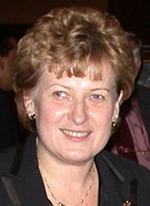August 2014

Jadwiga A. Wedzicha,
MD
Having just returned from lecturing at the COPD9 meeting in Birmingham, UK, Jadwiga “Wisia” A. Wedzicha, MD, settles into her London office for the phone interview before dashing off to the next commitment this June evening—her mother’s birthday. Navigating multiple requests has become second nature to Dr. Wedzicha, which is an indispensable skill for the next editor-in-chief of the American Journal of Respiratory and Critical Care Medicine (AJRCCM).
Dr. Wedzicha will officially take the reins of the AJRCCM from predecessor Jacob Iasha Sznajder, MD, in January 2015. To meet the demanding task of steering the Society’s flagship journal, Dr. Wedzicha will use the insights she’s gained from more than a decade in publishing. Since 2003, she has been a member of the AJRCCM Editorial Board, and she has served as an associate editor since 2013.
From 2002 to 2010, Dr. Wedzicha served as editor of Thorax and increased its international standing, submissions, and impact factor. She’s also served as a member of the editorial boards of the British Medical Journal, Polish Respiratory Journal, BioMed Central, and Primary Care Respiratory Journal. She was later asked to chair the European Respiratory Society Publications Committee and develop new strategies. This year, she has been serving as ombudsman of the Lancet, a position she will relinquish as she becomes AJRCCM editor.
“The standard of original papers has increased,” Dr. Wedzicha says from Imperial College London, where she was appointed clinical chair in respiratory medicine in April. “The standard of research is much higher than it was when I first became an editor of a journal. The editorial decisions are much more difficult than they’ve ever been.”
Dr. Wedzicha plans to focus on peer review, “which is a very important job that the respiratory community does for a journal,” she notes, adding that just as important is mobilizing international authors. “Ultimately, the quality of the journal depends on what is submitted. We must encourage the authors and readers to send us the very best papers from all over the world.”
Dr. Wedzicha also has the distinction of being a highly cited author. For the past 20 years, she has researched with continuous funding the causes and mechanisms of COPD exacerbations, and she has published more than 130 original papers and another 160 invited reviews.
“Effect of Exacerbation on Quality of Life in Patients with Chronic Obstructive Pulmonary Disease,” which she contributed to with lead author Terence A.R. Seemungal and published in the AJRCCM in 1998, continues to be one of the journal’s top cited papers on the subject. “Effect of Erythromycin on Exacerbations in COPD,” which she published with lead author Seemungal in the AJRCCM in 2008, is also highly cited and reflects her current research focus on mechanisms of macrolide action.
“Wisia’s greatest contribution to medicine has to be in the mechanisms of COPD exacerbations and in the recognition that exacerbations are important in the natural history of the disease,” says Gavin Donaldson, BSc, PhD, of the National Heart and Lung Institute at Imperial College. “This idea ran counter to the work of Fletcher and colleagues whose landmark study in the UK did not find that exacerbations affected decline in lung function and thus exacerbations were generally considered inconvenient but unimportant.”
Before joining Imperial College, Dr. Wedzicha had been professor of respiratory medicine at Barts and the London School of Medicine, Queen Mary University London, where her clinical work at the London Chest Hospital included running a home ventilation and sleep unit in addition to the COPD service from 1997 to 2005. The hospital serves primarily socioeconomically poor residents of east London, an experience that inspired her initial research in home oxygen therapy and, in particular, noninvasive ventilation. She then continued her interests in COPD and respiratory research when she moved to University College London and continued to run a home ventilation unit at the Royal Free Hospital.
“COPD research was an unmet need,” Dr. Wedzicha says. “I saw a lot of people at the time with chronic respiratory failure due to COPD who had a bad prognosis. It stimulated my work into home oxygen, then the possibility of evaluating home ventilation—both acutely and chronically. That led onto an interest into ‘what exactly are COPD exacerbations?’ And ‘what are the pathological and pathophysiological changes that accompany exacerbations?’”
“You must have very clear objectives, and you must ask the right questions right from the start.”—Jadwiga Wedzicha, MD
Dr. Wedzicha earned her MB and BS in 1978 and her MD in 1985 from the University of London. She earned membership of the Royal College of Physicians in 1980, and completed fellowships at the Royal College of Physicians in 1994 and the Academy of Medical Sciences in 2013.
“I learned from my mentors the value of very precise clinical observation and investigation,” Dr. Wedzicha says. “You must have very clear objectives, and you must ask the right questions right from the start. Be prepared to change if you need to. If one line of research is not fruitful, be brave enough to change and follow another path.”
Dr. Donaldson notes that among his colleague’s passions are her two British shorthair cats, Czarek and Kasia, tennis, and tending her beautiful garden at her South London home with her Polish mother who, with Dr. Wedzicha’s late father, immigrated to Britain after World War II and “will not be persuaded to stop carrying heavy loads to water the plants.”
Life in ATS
ATS Member Since: 1996
Primary Assembly: Respiratory Cell & Molecular Biology
Secondary Assembly: Clinical Problems
Committees:
- Assembly on CP Program Committee
- Documents Development and Implementation Committee
“What I like about publishing is that you can make a difference. The papers that go through the peer-review process improve significantly. You can make sure that the record in publication is as good as it can possibly be. Ultimately, what we publish is going to influence others. It has an enormous impact.”

